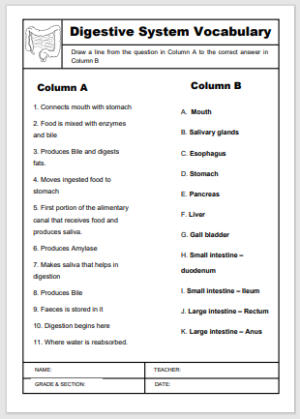The digestive system is made up of gastrointestinal tract and vital organs for digestion of food . These include the mouth, pharynx (throat), esophagus, stomach, small intestines, large intestines, rectum, and anus.
The digestive system includes the salivary glands, liver, gall, and pancreas, which make up digestive juices and enzymes that help digestion.
Medical Terminology for Digestive System
Following is the list of common terms associated with digestive system along with their explanation:
- Gallbladder: a small organ similar to the gallbladder
- Villi: fingerlike or threadlike projections from the surface of the intestines, enlarge the surface area and improve the passage of fluids or nutrients.
- Digestive Tract: The organs from where the food and liquids travel when swallowed, digested, absorbed, and leave the body as feces from rectum
- Large Intestine: absorbs more water from undigested substances
- Feces: waste matter left after digestion
- Enzymes: special substances that break down certain nutrients into smaller particles that the body can use.
- Enamel: the outer layer of the tooth; the most difficult thing in the body.
- Molars: digestive teeth
- Premolars: digestive teeth
- Incisors: tooth decay
- Canines: food teeth
- Saliva: fluid from the salivary glands
- Peristalsis: rhythmic muscle contraction that forces food into the stomach.
- Chyme: a mixture of soup in the stomach
- Acne: a non-digestible substance in the large intestine that has been transformed from a liquid soup into a solid mass
- Bile: a raw liquid used for digestion
- Rectum: the last part of the large intestine
- Anus: a hole in the end of the large intestine
- Sphincters: muscle bands throughout the abdomen
- Constipation: a condition in which the contents of the large intestine are dry which causes bowel movements to be difficult and slightly reduced.
- Diarrhea: a condition in which diarrhea is frequent and fluid
- Colon Cancer: uncontrolled growth of colon cells that cause tumor formation
- Gastric Ulcer: an open sore on the lining of the stomach
- Digestive System: the main parts of the mouth, throat, liver, stomach, pancreas, gall, intestines.
- Esophagus: a long straight tube that connects the mouth to the throat and abdomen.
- Stomach: a muscular organ, similar to a digestive tract; attached to the lower part of the throat.
- Small Intestine: muscular tube about 6 m long; a multi-chemical digestive tract.
- Mechanical Digestion: the physical breakdown of large pieces of food into smaller pieces
- Chemical Digestion: the process by which large molecules are broken down into smaller molecules
- Saliva: fluid from the salivary glands; initiates the chemical digestion of carbohydrates
- Peristalsis: a series of muscle contraction that pushes material into the digestive system
- Pancreas: an organ between the stomach and small intestines that produces digestive enzymes.
- Liver: a large, red organ that produces gall and retains nutrients
- Duodenum: the first part of the small intestine; it connects the stomach and small intestine
- Epiglottis: a small piece that closes the throat when you swallow.
- Acid Reflux: a painful condition in which acids return from the stomach to the throat, also called GERD (gastroesophageal reflux disease)
- Barrett’s Esophagus: a pre-cancerous esophagus cancer caused by chronic acid reflux.
- Cholangioscopy: examination of bile ducts by endoscopy.
- Polyps: small, well-developed polyps
- Proctoscope: a tool used to examine the anus and rectum
You can use the following worksheet to practice digestive system related terms that you have learned.
Quick Links


